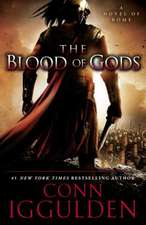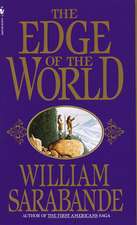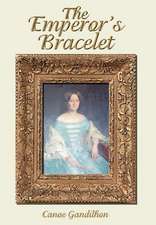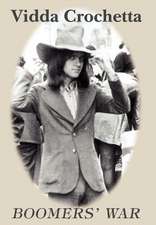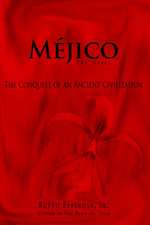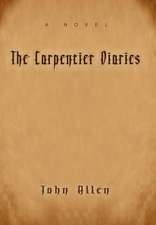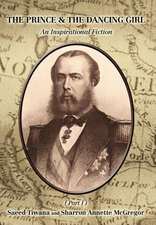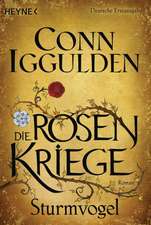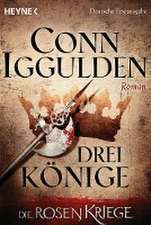Khan: Empire of Silver
Autor Conn Igguldenen Limba Engleză Paperback – 31 oct 2011
The Great Khan is dead—and his vast empire, forged through raw courage, tactical brilliance, and indomitable force, hangs in the balance. Now, with the sons of Genghis Khan maneuvering for supremacy, the very qualities that united the fierce Mongol tribes threaten to tear them apart.
Genghis’s tough and canny heir, Ogedai, is on the verge of becoming the new Khan. Inexplicably, Ogedai has delayed his coronation to complete a project many deem a folly: the building of Karakorum, a magnificent city amid the wild plains. His decision emboldens his arrogant brother Chagatai to violently challenge him, leaving their noble sibling Tolui caught between them. Yet even as they clash, the Khan’s armies extend his reach farther than ever before, into southern China and across the rugged mountains of Russia to the vulnerable heart of Europe, where the most courageous warriors the West commands await the coming onslaught.
Preț: 111.58 lei
Nou
Puncte Express: 167
Preț estimativ în valută:
21.35€ • 22.21$ • 17.63£
21.35€ • 22.21$ • 17.63£
Carte disponibilă
Livrare economică 25 martie-08 aprilie
Preluare comenzi: 021 569.72.76
Specificații
ISBN-13: 9780385344258
ISBN-10: 0385344252
Pagini: 399
Ilustrații: ONE MAP IN TEXT
Dimensiuni: 132 x 202 x 23 mm
Greutate: 0.34 kg
Editura: Bantam
ISBN-10: 0385344252
Pagini: 399
Ilustrații: ONE MAP IN TEXT
Dimensiuni: 132 x 202 x 23 mm
Greutate: 0.34 kg
Editura: Bantam
Notă biografică
Conn Iggulden is the author of three previous novels about Genghis Khan—Genghis: Birth of an Empire; Genghis: Lords of the Bow; and Genghis: Bones of the Hills—as well as the Emperor novels, which chronicle the life of Julius Caesar. He is also the co-author of the #1 bestseller The Dangerous Book for Boys and The Dangerous Book of Heroes. He lives with his wife and children in Hertfordshire, England.
From the Hardcover edition.
From the Hardcover edition.
Extras
ONE
The air swirled with marble dust that glittered as it caught the evening sun. Ogedai's heart was full as he guided his horse down the main thoroughfare, taking in every sight and sound around him. There was a sense of urgency in the cacophony of hammer blows and shouted orders. The Mongol tumans had gathered outside the city. His generals, his people, had been summoned there to see what two years of labor had created: a city in a wilderness, with the Orkhon River tamed and bent to his will.
Ogedai reined in for a moment to watch a group of workmen unload a cart. Nervous under his gaze, the laborers used ropes, pulleys, and sheer numbers to maneuver blocks of white marble onto low sledges that could be dragged into the workshops. Each milky block was subtly veined in a light blue that pleased Ogedai. He owned the quarry that had birthed the stones, hundreds of miles to the east, just one of a thousand purchases he had made in the last years.
There was no doubt he had been extravagant, spending gold and silver as if it had no value. He smiled at the thought, wondering what his father would have made of the white city rising in the wilderness. Genghis had despised the anthills of humanity, but these were not the ancient stones and teeming streets of an enemy. This was new and it belonged to the nation.
There had never been a treasury like the one he had inherited, amassed from the wealth of China and Khwarezm, yet never spent by its khan. With the tribute from Yenking alone, Ogedai could have sheathed every new home in white marble or even jade if he had wanted. He had built a monument to his father on the plains, as well as a place where he himself could be khan. He had built a palace with a tower that rose above the city like a white sword, so that all men could see the nation had come far from simple gers and herds.
For his gold, a million men had come to work. They had crossed plains and deserts with just a few animals and tools, coming from as far off as Chin lands or the cities of Samarkand, Bukhara, and Kabul. Masons and carpenters from Koryo had made the journey, called to the west by rumors of a new city being built on a river of coins. Bulgars brought stocks of rare clays, charcoal, and hardwood in great caravans from their forests. The city filled with traders, builders, potters, foodsellers, thieves, and scoundrels. Farmers scenting a profit brought their carts for days of travel, all for the strings of metal coins. Ogedai gave them gold and silver from the earth, melted and shaped. In return they gave him a city, and he did not find it a bad bargain. For the present, they were the colorful crowds of his city, speaking a hundred tongues and cooking a thousand different foods and spices. Some of them would be allowed to stay, but he was not building it for them.
Ogedai saw green-handed dyers flatten themselves against the walls, their red turbans dipping in respect. His Guards cleared the way ahead, so the son of Genghis could ride almost in a dream. He had made this place from the camp of gers his father had known. He had made it real, in stone.
It still amazed him. He had not paid for women to travel with his workers, but they had come with their husbands and fathers. He had wondered for a time how he would establish the businesses every city needed to thrive, but traders had approached his chancellor, offering horses or more silver to lease new properties. The city was more than a simple collection of houses. Already it had a vitality of its own, far beyond his control.
Yet not completely. A quirk in the plans had created an area of small alleyways in the south of his city. Criminal gangs had begun to flourish there until Ogedai heard. He had ordered eight hundred buildings torn down, the whole area redesigned and rebuilt. His own Guard had supervised the hangings.
The street fell quiet as he passed, the laborers and their masters bowing their heads as they saw the man who held the power of life and death and gold over all of them. Ogedai took a deep breath of the dusty air, enjoying the taste of it on his tongue and the thought that he was literally breathing in his creation. Ahead, he could see the towers of his palace, crowned in a dome of gold beaten thinner than the paper of his scribes. It raised his spirits to see it, like sunlight trapped and held in his city.
The street widened as it grew before him, its stone gutters polished. That section had been finished months before and the bustling crowds of laborers fell behind. As Ogedai trotted on, he could not help glancing at the boundary walls that had so confused his Chin architects and laborers. Even from the low vantage point of a saddle, there were moments when he could see over them to the green plains beyond. The walls of Yenking had not saved that city from fire or siege, he knew. His walls were the warriors of the khan, the tribes who had brought a Chin emperor to his knees and razed a shah's cities.
Already, Ogedai loved his creation, from the vast expanse of the central training ground, to the red-tiled roofs, the paved gutters, the temples and churches and mosques and markets and homes by the thousand, most still empty and waiting for life. Scraps of blue cloth fluttered in the plains wind on every corner, a tribute to the sky father above them all. In the south, green foothills and mountains stretched far away and the air was warm with dust as Ogedai rejoiced in Karakorum.
The twilight was deepening into a soft gloom as Ogedai handed his reins to a servant and strode up the steps to his palace. Before he entered, he looked back once more at the city straining to be born. He could smell fresh-turned earth and, over it, the fried food of the workmen on the evening air. He had not planned the herds of livestock in corrals beyond the walls, or the squawking chickens sold on every corner. He thought of the wool market that had sprung up by the western gate. He should not have expected trade to halt simply because the city was unfinished. He had chosen a spot on an ancient traders' road to give it life--and life had begun pouring in while whole streets, whole districts, were still piles of lumber, tile, and stone.
As he looked into the setting sun, he smiled at the cooking fires on the plains surrounding the city. His people waited there, for him. His armies would be fed on rich mutton, dripping fat from the summer grass. It reminded him of his own hunger, and he moistened his lips as he passed through a stone gate the equal of anything in a Chin city.
In the echoing hall beyond, he paused for a moment at his most extravagant gesture. A tree of solid silver stretched gracefully up to the arched ceiling, where the center point was open to the sky like the ger of any herdsman. It had taken the silversmiths of Samarkand almost a year to cast and polish, but it served his purpose. Whoever entered his palace would see it and be staggered at the wealth it represented. Some would see an emblem for the silver people, the Mongol tribes who had become a nation. Those with more wisdom would see that the Mongols cared so little for silver that they used it as a casting metal.
Ogedai let his hand slide down the bole of the tree, feeling the metal chill his fingers. The spreading branches reached out in a parody of life, gleaming like a white birch in moonlight. Ogedai nodded to himself. He stretched his back as lamps were lit by slaves and servants all around him, throwing black shadows and making the evening seem suddenly darker outside.
He heard hurrying footsteps and saw his manservant, Baras'aghur, approaching. Ogedai winced at the man's keen expression and the bundle of papers under his arm.
"After I have eaten, Baras. It has been a long day."
"Very well, my lord, but you have a visitor: your uncle. Shall I tell him to wait on your pleasure?"
Ogedai paused in the act of unbuckling his sword belt. All three of his uncles had come to the plains around Karakorum at his order, gathering their tumans in great camps. He had forbidden them all from entering the city, and he wondered who would have disobeyed him. He suspected it would be Khasar, who regarded orders and laws as tools for other men rather than himself.
"Who is it, Baras?" Ogedai asked quietly.
"Lord Temuge, master. I have sent servants to tend him, but he has been waiting now for a long time."
Baras'aghur made a gesture to indicate a sweep of the sun in the sky, and Ogedai pursed his lips in irritation. His father's brother would be well aware of the nuances of hospitality. Simply by arriving when Ogedai was not there to greet him, he had created an obligation. Ogedai assumed it was deliberate. A man like Temuge was too subtle not to grasp the slightest advantage. Yet the order had gone out for the generals and princes to remain on the plains.
Ogedai sighed. For two years, he had readied Karakorum to be the jewel in an empire. His had been a splendid isolation and he had maneuvered to keep it so, his enemies and friends always off balance. He had known it could not last forever. He steeled himself as he walked after Baras'aghur to the first and most sumptuous of his audience rooms.
"Have wine brought to me immediately, Baras. And food--something simple, such as the warriors are eating on the plain."
"Your will, my lord," his servant said without listening, his thoughts on the meeting to come.
The footsteps of the two men were loud in the silent halls, clicking and echoing back to them. Ogedai did not glance at the painted scenes that usually gave him so much pleasure. He and Baras'aghur walked under the best work of Islamic artists, and it was only toward the end that Ogedai looked up at a blaze of color, smiling to himself at the image of Genghis leading a charge at the Badger's Mouth pass. The artist had asked a fortune for a year's work, but Ogedai had doubled his price when he saw it. His father still lived on those walls, as well as in his memory. There was no art of painting in the tribes he knew, and such things could still make him gasp and stand in awe. With Temuge waiting, however, Ogedai barely nodded to his father's image before sweeping into the room.
The years had not been kind to his father's brother. Temuge had once been as fat as a feasting calf, but then lost the weight rapidly, so that his throat sagged into flaps of skin and he looked far older than his years. Ogedai looked at his uncle coldly as he rose from a silk-covered chair to greet him. It was an effort to be courteous to a man who represented the end of his time apart. He had no illusions. The nation waited impatiently for him and Temuge was just the first to breach his defenses.
"You are looking well, Ogedai," Temuge said.
He came forward as if he might embrace his nephew, and Ogedai struggled with a spasm of irritation. He turned away to Baras, letting his uncle drop his arms unseen.
"Wine and food, Baras. Will you stand there, staring like a sheep?"
"My lord," Baras'aghur replied, bowing immediately. "I will have a scribe sent to you to record the meeting."
He left at a run and both men could hear the slave's sandals clattering into the distance.
Temuge frowned delicately. "This is not a formal visit, Ogedai, for scribes and records."
"You are here as my uncle then? Not because the tribes have selected you to approach me? Not because my scholar uncle is the one man whom all the factions trust enough to speak to me?"
Temuge flushed at the tone and the accuracy of the remarks. He had to assume Ogedai had as many spies in the great camps as he had himself. That was one thing the nation had learned from the Chin. He tried to judge his nephew's mood, but it was no easy task. Ogedai had not even offered him salt tea. Temuge swallowed drily as he tried to interpret the level of censure and irritation in the younger man.
"You know the armies talk of nothing else, Ogedai." Temuge took a deep breath to steady his nerves. Under Ogedai's pale yellow eyes, he could not shake the idea that he was reporting to some echo of Genghis. His nephew was softer in body than the great khan, but there was a coldness in him that unnerved Temuge. Sweat broke out on his forehead.
"For two years, you have ignored your father's empire--" Temuge began.
"Do you think that is what I have done?" Ogedai interrupted.
Temuge stared at him. "What else am I to think? You left the families and tumans in the field, then built a city while they herded sheep. For two years, Ogedai!" He lowered his voice almost to a whisper. "There are some who say your mind has broken with grief for your father."
Ogedai smiled bitterly to himself. Even the mention of his father was like tearing the scab off a wound. He knew every one of the rumors. He had started some of them himself, to keep his enemies jumping at shadows. Yet he was the chosen heir of Genghis, the first khan of the nation. The warriors had almost deified his father, and Ogedai was certain he had nothing to fear from mere gossip in the camps. His relatives were a different matter.
The door swung open to reveal Baras'aghur and a dozen Chin servants. In moments, they had surrounded the two men, placing bronze cups and food on a crisp white cloth before them. Ogedai gestured for his uncle to sit cross-legged on the tiled floor, watching with interest as the older man's knees creaked and made him wince. Baras'aghur sent the servants away and then served tea to Temuge, who accepted the bowl in relief with his right hand, sipping as formally as he would have in any ger of the plains. Ogedai watched eagerly as red wine gurgled into his own cup. He emptied it quickly and held it out before Baras'aghur could move away.
From the Hardcover edition.
The air swirled with marble dust that glittered as it caught the evening sun. Ogedai's heart was full as he guided his horse down the main thoroughfare, taking in every sight and sound around him. There was a sense of urgency in the cacophony of hammer blows and shouted orders. The Mongol tumans had gathered outside the city. His generals, his people, had been summoned there to see what two years of labor had created: a city in a wilderness, with the Orkhon River tamed and bent to his will.
Ogedai reined in for a moment to watch a group of workmen unload a cart. Nervous under his gaze, the laborers used ropes, pulleys, and sheer numbers to maneuver blocks of white marble onto low sledges that could be dragged into the workshops. Each milky block was subtly veined in a light blue that pleased Ogedai. He owned the quarry that had birthed the stones, hundreds of miles to the east, just one of a thousand purchases he had made in the last years.
There was no doubt he had been extravagant, spending gold and silver as if it had no value. He smiled at the thought, wondering what his father would have made of the white city rising in the wilderness. Genghis had despised the anthills of humanity, but these were not the ancient stones and teeming streets of an enemy. This was new and it belonged to the nation.
There had never been a treasury like the one he had inherited, amassed from the wealth of China and Khwarezm, yet never spent by its khan. With the tribute from Yenking alone, Ogedai could have sheathed every new home in white marble or even jade if he had wanted. He had built a monument to his father on the plains, as well as a place where he himself could be khan. He had built a palace with a tower that rose above the city like a white sword, so that all men could see the nation had come far from simple gers and herds.
For his gold, a million men had come to work. They had crossed plains and deserts with just a few animals and tools, coming from as far off as Chin lands or the cities of Samarkand, Bukhara, and Kabul. Masons and carpenters from Koryo had made the journey, called to the west by rumors of a new city being built on a river of coins. Bulgars brought stocks of rare clays, charcoal, and hardwood in great caravans from their forests. The city filled with traders, builders, potters, foodsellers, thieves, and scoundrels. Farmers scenting a profit brought their carts for days of travel, all for the strings of metal coins. Ogedai gave them gold and silver from the earth, melted and shaped. In return they gave him a city, and he did not find it a bad bargain. For the present, they were the colorful crowds of his city, speaking a hundred tongues and cooking a thousand different foods and spices. Some of them would be allowed to stay, but he was not building it for them.
Ogedai saw green-handed dyers flatten themselves against the walls, their red turbans dipping in respect. His Guards cleared the way ahead, so the son of Genghis could ride almost in a dream. He had made this place from the camp of gers his father had known. He had made it real, in stone.
It still amazed him. He had not paid for women to travel with his workers, but they had come with their husbands and fathers. He had wondered for a time how he would establish the businesses every city needed to thrive, but traders had approached his chancellor, offering horses or more silver to lease new properties. The city was more than a simple collection of houses. Already it had a vitality of its own, far beyond his control.
Yet not completely. A quirk in the plans had created an area of small alleyways in the south of his city. Criminal gangs had begun to flourish there until Ogedai heard. He had ordered eight hundred buildings torn down, the whole area redesigned and rebuilt. His own Guard had supervised the hangings.
The street fell quiet as he passed, the laborers and their masters bowing their heads as they saw the man who held the power of life and death and gold over all of them. Ogedai took a deep breath of the dusty air, enjoying the taste of it on his tongue and the thought that he was literally breathing in his creation. Ahead, he could see the towers of his palace, crowned in a dome of gold beaten thinner than the paper of his scribes. It raised his spirits to see it, like sunlight trapped and held in his city.
The street widened as it grew before him, its stone gutters polished. That section had been finished months before and the bustling crowds of laborers fell behind. As Ogedai trotted on, he could not help glancing at the boundary walls that had so confused his Chin architects and laborers. Even from the low vantage point of a saddle, there were moments when he could see over them to the green plains beyond. The walls of Yenking had not saved that city from fire or siege, he knew. His walls were the warriors of the khan, the tribes who had brought a Chin emperor to his knees and razed a shah's cities.
Already, Ogedai loved his creation, from the vast expanse of the central training ground, to the red-tiled roofs, the paved gutters, the temples and churches and mosques and markets and homes by the thousand, most still empty and waiting for life. Scraps of blue cloth fluttered in the plains wind on every corner, a tribute to the sky father above them all. In the south, green foothills and mountains stretched far away and the air was warm with dust as Ogedai rejoiced in Karakorum.
The twilight was deepening into a soft gloom as Ogedai handed his reins to a servant and strode up the steps to his palace. Before he entered, he looked back once more at the city straining to be born. He could smell fresh-turned earth and, over it, the fried food of the workmen on the evening air. He had not planned the herds of livestock in corrals beyond the walls, or the squawking chickens sold on every corner. He thought of the wool market that had sprung up by the western gate. He should not have expected trade to halt simply because the city was unfinished. He had chosen a spot on an ancient traders' road to give it life--and life had begun pouring in while whole streets, whole districts, were still piles of lumber, tile, and stone.
As he looked into the setting sun, he smiled at the cooking fires on the plains surrounding the city. His people waited there, for him. His armies would be fed on rich mutton, dripping fat from the summer grass. It reminded him of his own hunger, and he moistened his lips as he passed through a stone gate the equal of anything in a Chin city.
In the echoing hall beyond, he paused for a moment at his most extravagant gesture. A tree of solid silver stretched gracefully up to the arched ceiling, where the center point was open to the sky like the ger of any herdsman. It had taken the silversmiths of Samarkand almost a year to cast and polish, but it served his purpose. Whoever entered his palace would see it and be staggered at the wealth it represented. Some would see an emblem for the silver people, the Mongol tribes who had become a nation. Those with more wisdom would see that the Mongols cared so little for silver that they used it as a casting metal.
Ogedai let his hand slide down the bole of the tree, feeling the metal chill his fingers. The spreading branches reached out in a parody of life, gleaming like a white birch in moonlight. Ogedai nodded to himself. He stretched his back as lamps were lit by slaves and servants all around him, throwing black shadows and making the evening seem suddenly darker outside.
He heard hurrying footsteps and saw his manservant, Baras'aghur, approaching. Ogedai winced at the man's keen expression and the bundle of papers under his arm.
"After I have eaten, Baras. It has been a long day."
"Very well, my lord, but you have a visitor: your uncle. Shall I tell him to wait on your pleasure?"
Ogedai paused in the act of unbuckling his sword belt. All three of his uncles had come to the plains around Karakorum at his order, gathering their tumans in great camps. He had forbidden them all from entering the city, and he wondered who would have disobeyed him. He suspected it would be Khasar, who regarded orders and laws as tools for other men rather than himself.
"Who is it, Baras?" Ogedai asked quietly.
"Lord Temuge, master. I have sent servants to tend him, but he has been waiting now for a long time."
Baras'aghur made a gesture to indicate a sweep of the sun in the sky, and Ogedai pursed his lips in irritation. His father's brother would be well aware of the nuances of hospitality. Simply by arriving when Ogedai was not there to greet him, he had created an obligation. Ogedai assumed it was deliberate. A man like Temuge was too subtle not to grasp the slightest advantage. Yet the order had gone out for the generals and princes to remain on the plains.
Ogedai sighed. For two years, he had readied Karakorum to be the jewel in an empire. His had been a splendid isolation and he had maneuvered to keep it so, his enemies and friends always off balance. He had known it could not last forever. He steeled himself as he walked after Baras'aghur to the first and most sumptuous of his audience rooms.
"Have wine brought to me immediately, Baras. And food--something simple, such as the warriors are eating on the plain."
"Your will, my lord," his servant said without listening, his thoughts on the meeting to come.
The footsteps of the two men were loud in the silent halls, clicking and echoing back to them. Ogedai did not glance at the painted scenes that usually gave him so much pleasure. He and Baras'aghur walked under the best work of Islamic artists, and it was only toward the end that Ogedai looked up at a blaze of color, smiling to himself at the image of Genghis leading a charge at the Badger's Mouth pass. The artist had asked a fortune for a year's work, but Ogedai had doubled his price when he saw it. His father still lived on those walls, as well as in his memory. There was no art of painting in the tribes he knew, and such things could still make him gasp and stand in awe. With Temuge waiting, however, Ogedai barely nodded to his father's image before sweeping into the room.
The years had not been kind to his father's brother. Temuge had once been as fat as a feasting calf, but then lost the weight rapidly, so that his throat sagged into flaps of skin and he looked far older than his years. Ogedai looked at his uncle coldly as he rose from a silk-covered chair to greet him. It was an effort to be courteous to a man who represented the end of his time apart. He had no illusions. The nation waited impatiently for him and Temuge was just the first to breach his defenses.
"You are looking well, Ogedai," Temuge said.
He came forward as if he might embrace his nephew, and Ogedai struggled with a spasm of irritation. He turned away to Baras, letting his uncle drop his arms unseen.
"Wine and food, Baras. Will you stand there, staring like a sheep?"
"My lord," Baras'aghur replied, bowing immediately. "I will have a scribe sent to you to record the meeting."
He left at a run and both men could hear the slave's sandals clattering into the distance.
Temuge frowned delicately. "This is not a formal visit, Ogedai, for scribes and records."
"You are here as my uncle then? Not because the tribes have selected you to approach me? Not because my scholar uncle is the one man whom all the factions trust enough to speak to me?"
Temuge flushed at the tone and the accuracy of the remarks. He had to assume Ogedai had as many spies in the great camps as he had himself. That was one thing the nation had learned from the Chin. He tried to judge his nephew's mood, but it was no easy task. Ogedai had not even offered him salt tea. Temuge swallowed drily as he tried to interpret the level of censure and irritation in the younger man.
"You know the armies talk of nothing else, Ogedai." Temuge took a deep breath to steady his nerves. Under Ogedai's pale yellow eyes, he could not shake the idea that he was reporting to some echo of Genghis. His nephew was softer in body than the great khan, but there was a coldness in him that unnerved Temuge. Sweat broke out on his forehead.
"For two years, you have ignored your father's empire--" Temuge began.
"Do you think that is what I have done?" Ogedai interrupted.
Temuge stared at him. "What else am I to think? You left the families and tumans in the field, then built a city while they herded sheep. For two years, Ogedai!" He lowered his voice almost to a whisper. "There are some who say your mind has broken with grief for your father."
Ogedai smiled bitterly to himself. Even the mention of his father was like tearing the scab off a wound. He knew every one of the rumors. He had started some of them himself, to keep his enemies jumping at shadows. Yet he was the chosen heir of Genghis, the first khan of the nation. The warriors had almost deified his father, and Ogedai was certain he had nothing to fear from mere gossip in the camps. His relatives were a different matter.
The door swung open to reveal Baras'aghur and a dozen Chin servants. In moments, they had surrounded the two men, placing bronze cups and food on a crisp white cloth before them. Ogedai gestured for his uncle to sit cross-legged on the tiled floor, watching with interest as the older man's knees creaked and made him wince. Baras'aghur sent the servants away and then served tea to Temuge, who accepted the bowl in relief with his right hand, sipping as formally as he would have in any ger of the plains. Ogedai watched eagerly as red wine gurgled into his own cup. He emptied it quickly and held it out before Baras'aghur could move away.
From the Hardcover edition.
Recenzii
“Iggulden has created another rip-roaring historical.”—Publishers Weekly
“This is alpha-male fiction. . . . the book has much to teach about a time and a people long shrouded in legend.”—The Wall Street Journal
“Well written and well researched . . . a delicious pleasure for anyone who likes roaring, violent, and dramatic historical fiction.”—Library Journal
“Empire of Silver serves as confirmation that Iggulden’s majestic series has developed into an historical fiction master class.”—Yorkshire Evening Post
“This is alpha-male fiction. . . . the book has much to teach about a time and a people long shrouded in legend.”—The Wall Street Journal
“Well written and well researched . . . a delicious pleasure for anyone who likes roaring, violent, and dramatic historical fiction.”—Library Journal
“Empire of Silver serves as confirmation that Iggulden’s majestic series has developed into an historical fiction master class.”—Yorkshire Evening Post

